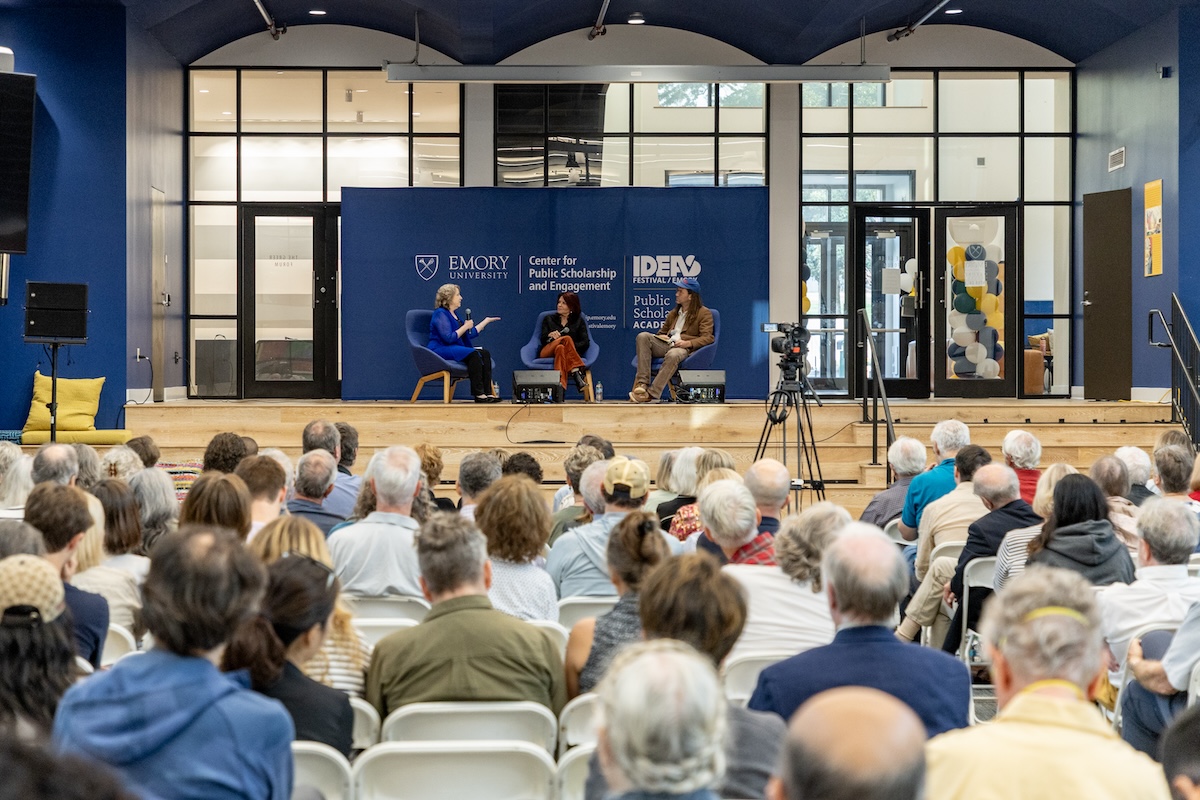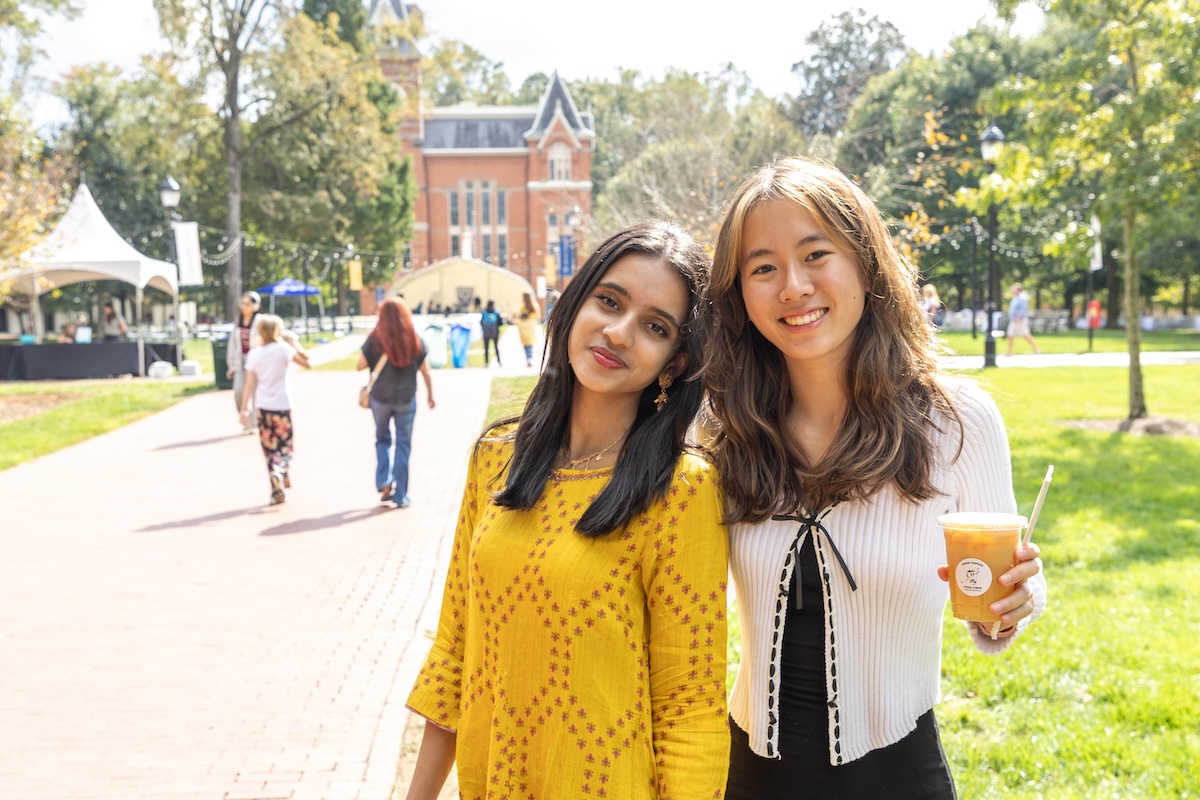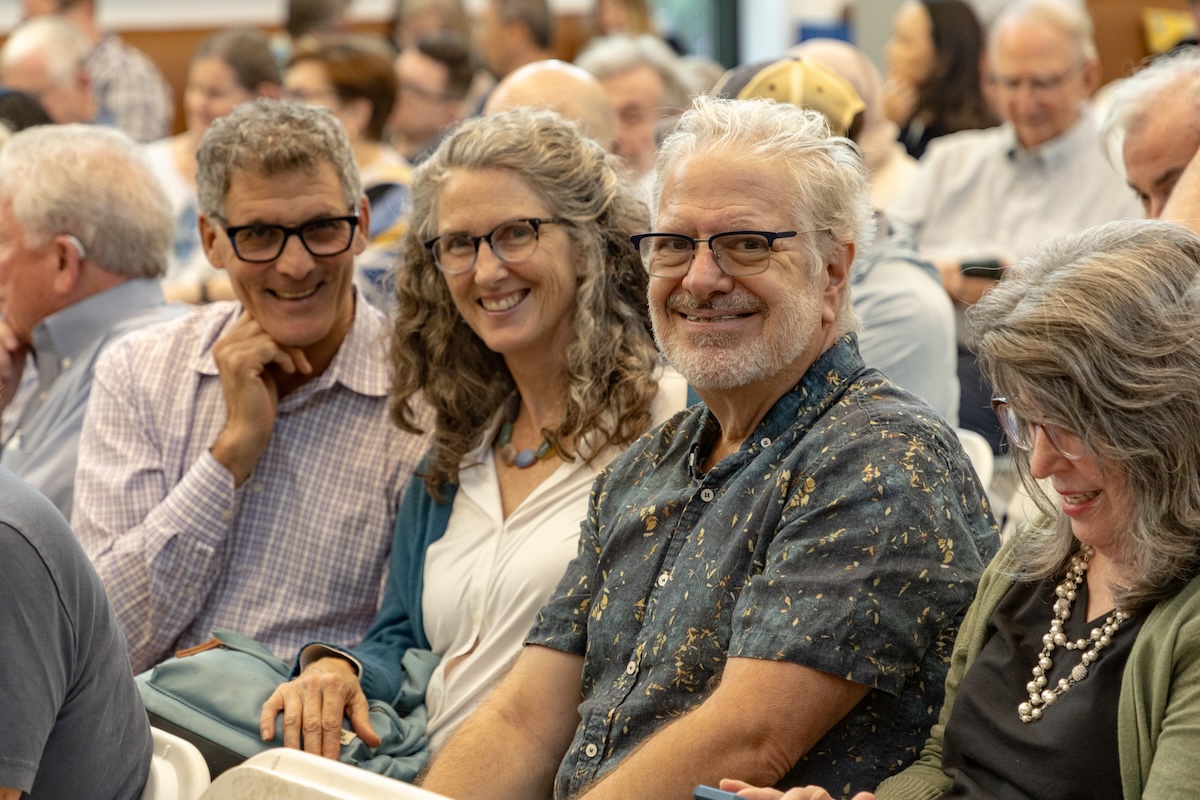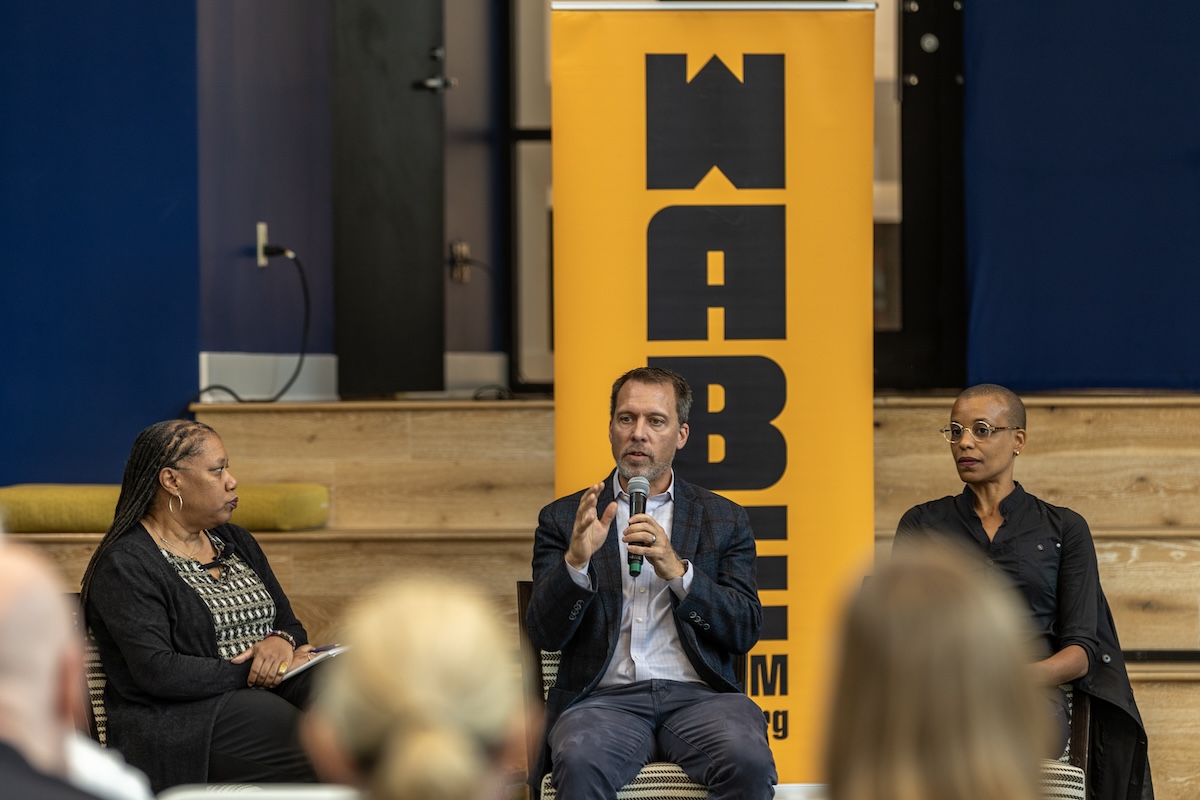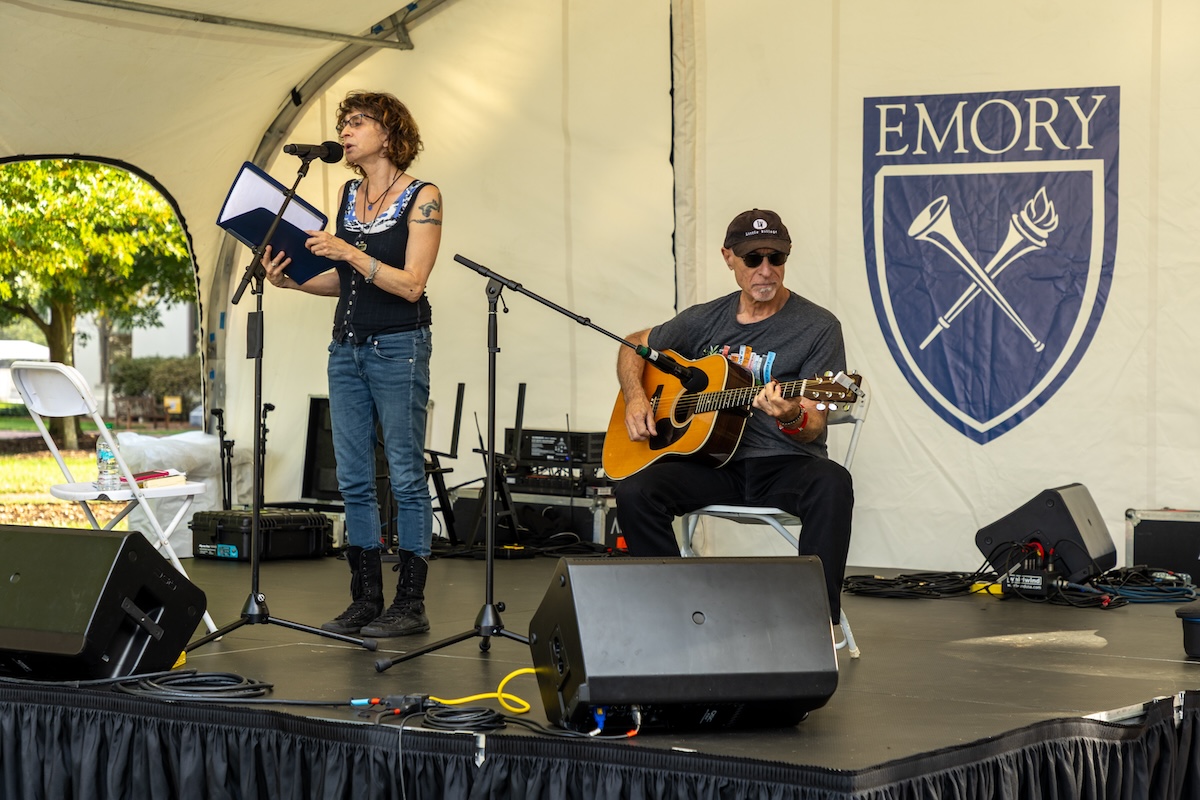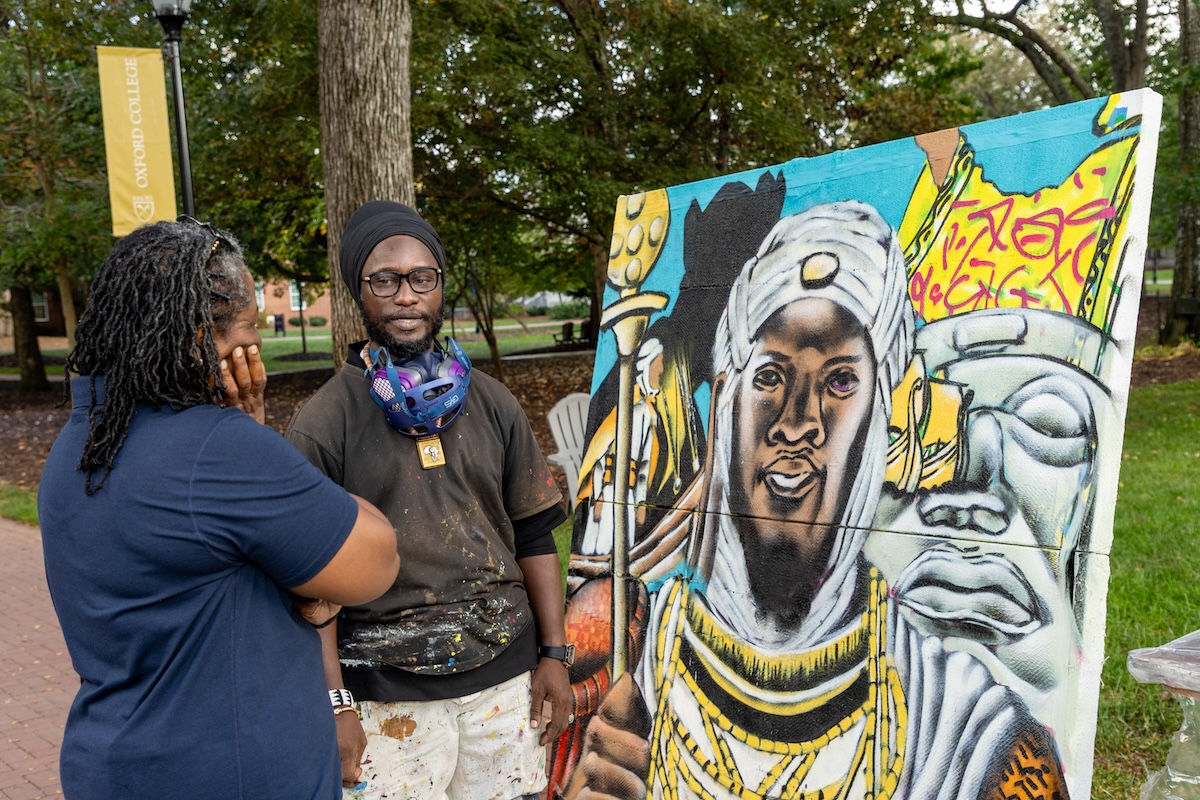The voice of legendary singer-songwriter Rosanne Cash has been to known stir an audience.
And that’s just what happened at the second annual Ideas Festival Emory, held recently at the university’s Oxford College campus. To conclude her keynote address, Cash, a four-time Grammy Award-winner, surprised the crowd with a performance of the old Appalachian hymn “Will the Circle Be Unbroken” — a Cash family favorite.
A recording of the sold-out keynote discussion, an episode of the Sing for Science Podcast, is now available to view.
It was one of many highlights from a day of thoughtful discussion and community, including live music performances on the Quad, food trucks and children’s programming.
As the flagship event of the Emory Center for Public Scholarship and Engagement, the festival hosts scholars from Emory and beyond, artists and industry leaders for rich conversations about how their work intersects. Topics for this year’s Oct. 18 event ranged from the importance of local journalism to the science of horror to the city-planning complexities of Atlanta’s upcoming World Cup matches.
The keynote was held on-stage at the Oxford Student Center. When Cash began to sing, she wasn’t alone. Voices from the packed audience joined in as podcast host Matt Whyte strummed a guitar.
“That moment represented everything the festival stands for,” said Kenneth Carter, Charles Howard Candler professor of psychology and founding director of the Center for Public Scholarship and Engagement.
“It’s a celebration of curiosity, connection and creativity,” he said. “We worked hard to craft sessions that invited the community to explore the world from new perspectives. The result was a lively and deeply engaging shared experience that brought scholars, artists and the community together.”
Robyn Fivush, Samuel Candler Dobbs Professor of Psychology at Emory, joined the Sing for Science podcast to discuss her research on autobiographical memory and how sharing family stories can build a sense of identity and resilience in children — themes that resonate with Cash’s life and career.
Fivush noted that Cash’s family stories “sit on an interesting border.” As the daughter of legendary country musicians Johnny Cash and June Carter Cash, Rosanne Cash makes music infused not only with her personal experience but also with the “mythology of America,” Fivush explained.
When she turned 18, Cash’s father gave her a list of 100 songs to learn the heart of country music. After all, who would know better than Johnny Cash?
That memory was the inspiration for her 2009 album “The List,” which features covers of several songs from the document her father scribbled while riding in the back of a tour bus, written over many long hours of open road.
“It was a really deep development of world for me,” she said.
“In many ways, ‘The List’ is almost like your family heirloom, like passing down an important piece of jewelry,” Fivush responded. “What's important about those heirlooms is the stories that come with them.”
For Cash, music is an ancestral practice. She said it even helped her “organize grief” around her father’s death.
Fivush’s research supports the idea that family stories can help people process traumatic events and put them in context across time.
“Oddly, I started writing the first song [about grief] before anyone died,” Cash said, noting she wasn’t sure if the inspiration came from a sense of spirituality or quantum physics.
“Creative work happens outside of linear time,” she continued. “So, I wrote the first song about his death called ‘Black Cadillac.’ When I finished with it, I knew it was a postcard from the future.”
Big ideas
Each corner of the Oxford campus was home to a living, breathing idea that experts and the community explored together. Here are a few of the engaging topics featured in this year’s festival:
The importance of public art
A morning session featured muralist Krista M. Jones (aka JONESY) and graffiti artist POEST discussing the importance of public art with Randy Gue, a curator at Emory’s Stuart A. Rose Manuscript, Archives and Rare Book Library.
POEST and JONESY said public art is essential to shaping how people experience communal spaces, how cities tell their stories and how communities see themselves reflected in the built environment.
“We plan these colors for [the public’s] enjoyment,” POEST said of his vibrant graffiti across Atlanta. He added that people often come up to him and share: “I looked out the window, I saw what you guys did … It changed my whole perspective for the day.”
Revisiting an ‘American Coup’
Carol Anderson, Robert W. Woodruff Professor of African American Studies, was one of eight Emory faculty to participate in the festival.
She led a talk with filmmaker Brad Lichtenstein about his 2024 documentary “American Coup: Wilmington 1898,” which examines attempts to slow political enfranchisement of Black citizens in the titular city. Those efforts ultimately ended in a race massacre, with the murder and exile of thousands of Black people. The film engages descendants of the massacre, on both sides, as they attempt to reconcile with their troubled history in the present.
Anderson’s research focuses on how policy is shaped by and responds to racial inequality, and how those impacted by discriminatory laws work to challenge and reshape the system to reclaim their rights and humanity.
At the festival, Lichtenstein played short clips of the film and discussed their historical resonance with Anderson.
“There’s a pattern of the loss of generational wealth,” Anderson said, reflecting on Wilmington and other instances of mass violence in the Jim Crow era, such as Atlanta in 1906 and Tulsa in 1921.
“To try to distance ourselves from that history and say it doesn’t matter, or it doesn’t affect us — it really does,” she said. “What you’re able to build generationally is so powerful. We had systemic erasure of families’ hard work and families’ achievements.”
In the film, descendants come from all over the country to observe a commemoration of the race massacre. The gathering was “emblematic of the loss of generational wealth,” Lichtenstein said. But in that moment of intergenerational reconnection, “they became like a family.”
Journalism as civic infrastructure
In another session, panelists made a forceful case that local journalism is not a nostalgic luxury — it is civic infrastructure, as vital to democracy as roads, schools or public health.
Moderated by Moni Basu, award-winning reporter and Charlayne Hunter-Gault Distinguished Writer in Residence at the University of Georgia, the discussion traced the rise, contraction and reinvention of local news in an era defined by digital disruption and public distrust. It featured Keith Pepper, publisher of Rough Draft Atlanta; Janel Davis, the Atlanta Journal-Constitution’s managing editor for lifestyle and culture; and Evan Newton, managing editor of the Covington News.
Why libraries and museums matter
Later in the afternoon, Kevin Young, poetry editor of The New Yorker and former director of the Smithsonian’s National Museum of African American History and Culture, joined Jessica Handler, author of the 2019 novel “The Magnetic Girl,” to discuss how libraries, museums and archives are far more than places that hold the past; they are spaces where people fall in love with stories, ideas, history and each other.
“I used to think [archives and libraries] were about objects,” said Young, who was also an Emory English and creative writing professor from 2005-2016. “But they’re really about people — about handwriting, marginalia, the traces of lives left behind.”
World Cup comes to Atlanta
Another panel explored how Atlanta is preparing to host its eight World Cup matches this summer. World Cup organizers have said each match is expected to bring the economic impact of one-and-a-half Super Bowls — which would make 12 for Atlanta.
The panel featured Doug Shipman, president of the Atlanta City Council and an Emory alumnus; Alison Cross, founder of Boxcar Grocer, which seeks to increase food access in underserved areas; Geoffery Loften of the Decide Dekalb Development Authority; and Marc E. Parham, director of entrepreneurship for the Urban League of Greater Atlanta.
Their discussion was broadcast on WABE radio and moderated by Rose Scott, host of the station’s midday news program “Closer Look.”
“This is as big a global event as there is,” Shipman said, and its economic and social impact will be felt across the Atlanta area.
Panelists discussed the pros and cons of what hosting World Cup matches may mean for the city. They looked at issues such as security concerns; how businesses can prepare and expand staffing to accommodate the influx of customers; how city programs can engage international visitors; and support for vulnerable communities, such as the unhoused, who will be affected by the large crowds.
Cross said the World Cup is an opportunity for Atlanta to reflect on its own identity and the effectiveness of its infrastructure and institutional processes: “The question that Atlanta has is, ‘What kind of party do we want to throw?’”


